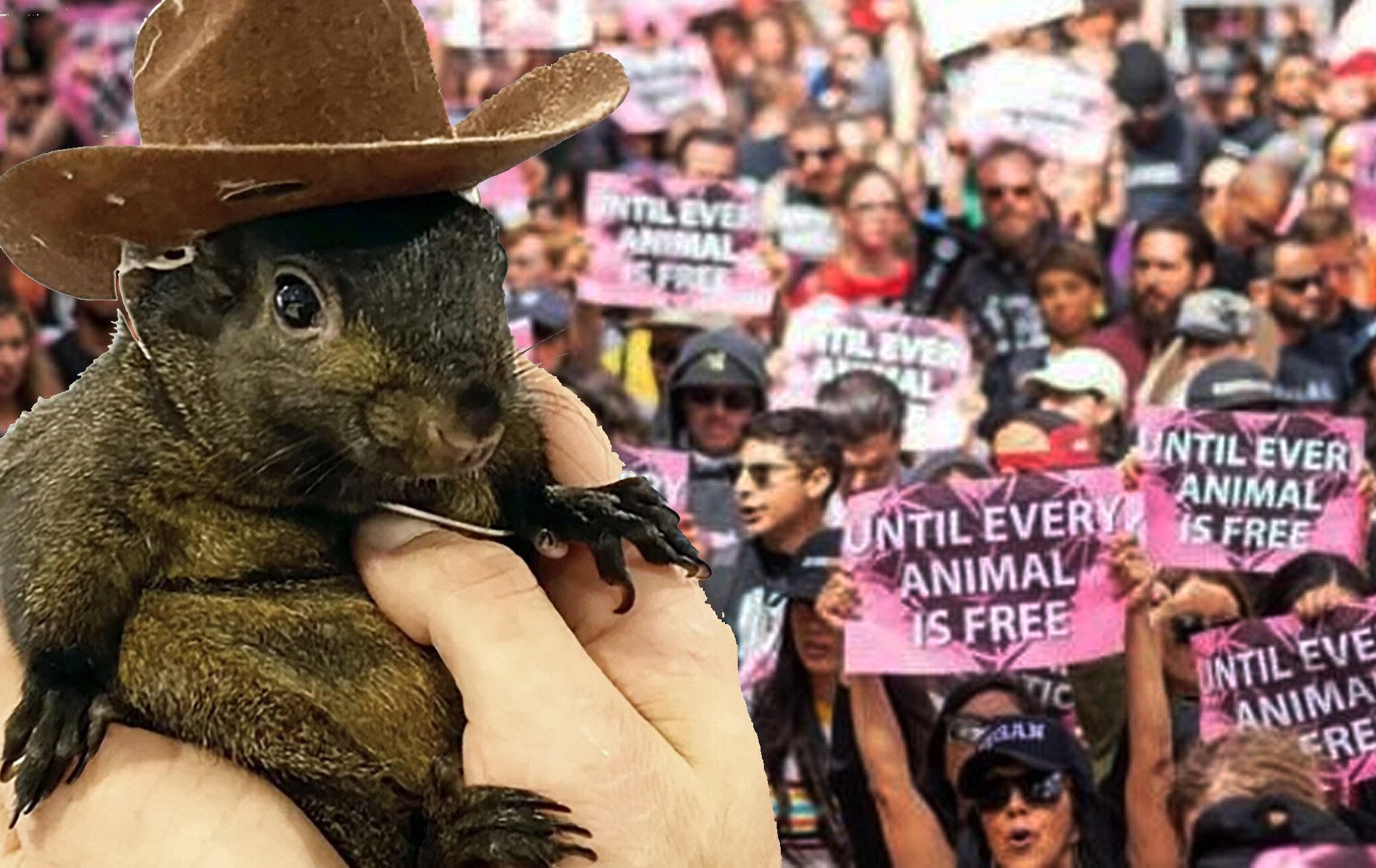
A Political Movement for Animal Rights Is Coming
People sympathize with animals, and yet we treat them horrifically. But a broad social movement can—and will—bring about a transformation.
P’nut the Squirrel was hardly a household name before election day, though he had an Instagram following of sorts. But since he was killed by New York’s Department of Environmental Conservation on November 1—the victim of a raid on a supposedly unlicensed wildlife rehabber—P’nut has become a cause célèbre on the right. Donald Trump pounced on the opportunity to condemn Democratic bureaucrats for “needlessly” murdering the creature in an act of overreach that he said needed to be “avenged” at the ballot box.
Consider the numbers. A few days before the election, Kamala Harris posted that hip hop artist Cardi B had endorsed her presidential campaign, which earned an impressive 800,000-plus likes on TikTok. But Donald Trump’s post in support of P’nut on the same day got nearly double the amount of likes—and was accompanied by a wave of similarly viral posts by Elon Musk, Donald Trump Jr., and others. “I have no way to explain how important this is to me,” read one comment by a woman of color in New York City in response to Trump’s post. By pushing massive anti-Democratic sentiment so close to the election, the right may have P’nut to thank, in part, for Trump’s victory.
That is, of course, speculation. But what is less speculative is that animal stories played a significant role in the 2024 election. From Kristi Noem’s shooting of her dog Cricket to the false claims by JD Vance and Donald Trump that Haitians were eating Americans’ pets, violence against animals went viral this electoral cycle. The concern about cruelty to animals in this election was heartfelt and real. But it was also unprincipled and politically quiescent. Millions mourned the murder of P’nut, but no one thought twice about Eric Adams’s brutal mass drowning of rodents in New York City in 2019. While Democrats condemned Kristi Noem for killing her dog, they were silent about the thousands of lab beagles subjected to surgical mutilation without anesthesia in blue strongholds like Madison, Wisconsin. Ezra Klein had a run of vegetarian guests on his influential podcast in the month before the election, but not a word was said about the ethics of killing animals for meat. What was missing in all of these stories—and in the public’s response to them—was a political argument for animal rights.
What explains this? The answer is not a lack of philosophical legitimacy. Sixty percent of moral philosophers say it’s wrong to eat at least some kinds of animals (compared to just 19 percent of non-ethicists). When thought leaders are asked which practices future generations will most strongly condemn, the abuse of animals is routinely at the top of the list, by writers on both the right and the left.
The answer is also not a lack of popular appeal. Large numbers of Americans care about animals. Indeed, it is one of the few moral issues that has massive bipartisan appeal, with around 80 percent of Americans (including 77 percent of Republicans) stating that farm animal welfare is a personal moral concern.
Instead, the answer lies in two factors that are not obvious at first glance. The first is what Harvard’s Cass Sunstein calls “preference falsification.” In many periods through history, people hide their real preferences because they’re concerned that “coming out” will lead to social disapproval. The result of this preference falsification is that issues that might earn public support become politically invisible. The classic case study is the gay rights movement prior to the 1970s. As long as gay people remained closeted, there could be no political argument about gay rights.
The same dynamic applies to animal rights. Ezra Klein, among others, has spoken about how coming out as a vegan—what he calls “taking the green pill”—was the hardest thing he’s ever done as a political writer. Those same social forces likely silence millions of animal rights supporters across the nation.
The second factor is the animal rights movement’s lack of vision, or a compelling story for change. The classic case study for the importance of vision is the Civil Rights Movement. Martin Luther King Jr. inspired the nation by setting out both a moral crisis (the terrors of Jim Crow) and opportunity (the dream of racial equality). The renowned sociologist Doug McAdam calls this story of crisis and opportunity “cognitive liberation.” Without each piece, a movement’s supporters are politically dormant. There’s no motivation for change without a crisis. And there’s no point in agitating for change without an opportunity. When combined, crisis and opportunity set out a vision—that is, a compelling story for change.
And vision has been sorely lacking in animal rights. Even terrible cases of abuse, such as P’nut’s killing, are understood as one-off incidents of misconduct, rather than symbols of a broader moral crisis. And animal rights activists are notoriously bad at describing the opportunity presented by our movement. “My burger is more ethical than yours” is not quite as inspiring as King’s dream of racial equality. It should come as no surprise that the message has failed to inspire a political movement. We lack a compelling story for change.
But these factors holding the movement back are shifting.
Preference falsification is reversing. A critical mass is coming out in support of animal rights across the globe, ranging from tech titans in the United States to courts in Argentina. In Silicon Valley, Google founder Larry Page broke with Elon Musk over the latter’s “speciesism,” or the favoring of humans over non-human species. OpenAI CEO Sam Altman has publicly called meat consumption a “horror” and says that we should draw on “better morals” to stop doing it. In the U.K., one third of the population now approves of a vegan diet, and a number of the most prominent universities, such as Cambridge and University College London, have approved student resolutions to transition to 100 percent plant-based catering. An Argentinian court recognized that an orangutan named Sandra was a “non-human person” who must be freed from a zoo cage. When a critical mass “comes out” for a cause, change can happen very quickly, as more and more people say, “Hey, I believe that, too.” This is the sort of cascade we last saw for gay rights—and animal rights could be next.
The animal rights movement’s lack of vision is also reversing, as advocates find more compelling stories for change. Increasingly, animal advocates such as Yuval Noah Harari are describing the abuse of animals not just as unfortunate suffering but as one of history's greatest crimes. The liberation of animals, moreover, is an opportunity to confront the deeper maladies in the human condition. In a world that is increasingly lonely, Americans are spending a record amount of time with their pets. And the animal stories have gone viral repeatedly in part because animals are the perfect victims; unlike human beings, their cries are never performative. Their exploitation is brutal and limitless and real. Perhaps only by defending these beings—and not just pets whose company we enjoy, but all animals, who will always be the most powerless in our society—can our political system convince the public at large that it will defend us all.
And activists are already seizing this opportunity. In 2019, California became the first state in U.S. history to completely ban a major animal product, fur, on ethical grounds. In 2020, the first all-purpose federal animal cruelty law was proudly signed by… Donald Trump. And in 2022, I was acquitted by a jury in rural Utah after infiltrating a factory farm and rescuing two sick piglets from the largest pig factory farm in the nation. The animal rights movement is moving rapidly towards its most fundamental goal: recognition that animals are “legal persons” and not things.
P’nut, of course, will not see this opportunity. But, by the next presidential election, perhaps the nation will. Animal rights already has immense passion behind it. Soon, it will also be a political force.





